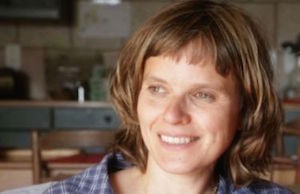
Gentrification Focus of Oct. 30 UC Sociology Lecture
In urban environments, class conflicts can arise as working-class neighborhoods experience new growth of restaurants, shops and apartments. What used to be a struggling neighborhood can become a highly sought-after place to live, skyrocketing the cost of living and pushing out the working-class people who lived there for decades. This is a familiar description of gentrification, a topic being explored this month in a talk organized by the UC sociology department entitled
Good Neighbors: A case study of gentrification in Boston, presented by Sylvie Tissot of the University of Paris at 3 p.m. Oct. 30, at the Taft Research Center in Edwards 1.
During her talk, Tissot a Professor of Political Science at the University of Paris-8 will explore the lifestyle and characteristics of gentrifiers. One characteristic of the middle and upper-class gentrifiers who moved into South Boston is their taste for diversity. Tissot will examine the local engagement of gentrifiers who endorse openness and tolerance but who exercise these values with a great deal of caution. She describes the way this curious combination of inclusion and exclusion has reorganized the way that classes relate.
The changes in one neighborhood can teach us a lot about larger processes of inequality in our society, says Dr. Sarah Mayorga-Gallo, assistant professor of sociology at UC.
Bostons South End, a legendary working-class neighborhood with the largest Victorian brick row house district in the United States and a celebrated reputation for diversity has become in recent years a flashpoint for the problems of gentrification. The neighborhood has witnessed the kind of rapid transformation that leads to tense battles over the class and race politics both nationally and globally.
Dr. Tissots research focuses on neighborhood change and gentrification, so it definitely reflects some of what were seeing in Over-The-Rhine, says Mayorga-Gallo. She chronicles how the neighborhood group with the most resources gets to define what happens to a neighborhood. That often is not the community that has been there the longest, but the newest additions.
This talk is developed from Tissots book Good Neighbors: Gentrifying diversity in Bostons South End, recently published and available for purchase by Verso Books. Good Neighbors will be available for purchase at her campus lecture. Her academic research stands at the intersection of class analysis and urban studies, and in her book, Tissot poses critical questions about the damaging power of gentrification: What do we talk about when we talk about gentrification? Does gentrification destroy diversity? Or does it thrive on it?
Gentrification encapsulates multiple issues of interest to social scientists, says Mayorga-Gallo. From racial and ethnic relations to economic inequality, internal migration and capitalist economic development. Tissots newest research project is a comparison of gay-friendly attitudes in New York and Paris. She has been a visiting scholar at Harvards Center for European Studies and the Institute for Public Knowledge at New York University.
A feminist activist as well as filmmaker, Tissot is the co-founder of the website Les mots sont importants, where she engages in public debates about feminism, race and religion. With her sister, Florence Tissot, she has made two documentaries about the French feminist Christine Delphy: Im Not a Feminist, But and Christine Delphy From A to Z.
Tissots talk is a part of the Department of Sociologys 2015-2016 Colloquium series and is cosponsored by the School of Planning, the Taft Urban Studies Research Group, and the Department of Romance Languages. For over 30 years, the Department of Sociology has run a biweekly Colloquium Series, the longest such series on the UC campus, which features speakers from the department and other related departments. Additionally, the Colloquium Series includes a yearly visit from a nationally-renowned sociologist, sponsored by funds from the Charles Phelps Taft Research Center.
There are two more colloquia scheduled for the fall semester: 1) Tissots on Oct. 30 and 2) Katherine Castiello Jones (University of Massachusetts Amherst) on Friday, Nov. 20. Both will be held in the Taft Research Center in Edwards 1 at 3pm. Joness talk is titled I Don't Give a Phunk: Promoting Abstinence through Coolness For more information on this talk or the Sociology Colloquium series, please contact Sarah Strouse, Program Coordinator for the Department of Sociology, at 513-556-4720, stroussa@ucmail.uc.edu, or by visiting the Department of Sociology Website.
Related Stories
Information Security Roadshow spreads awareness
May 3, 2024
The University of Cincinnati's Office of Information Security launched a series of 18 in-person sessions from January to April 2024, drawing nearly 350 attendees from the staff of various UC colleges and units. The Information Security Roadshow series aimed to equip the audience with knowledge on prevailing cyber threats, prevention strategies, how to report incidents and resources to stay informed and secure.
UC alum makes her mark in research, service
May 3, 2024
In 1960, as a young and eager statistician, Joan Reisch graduated from UC’s College of Arts and Sciences, and pursued a career in Texas at the Southwestern Medical Center where she’s held numerous roles as both faculty and staff. This year, Reisch was recognized for her career accomplishments and contributions with the Philanthropist of the Year Award by UC’s Alumni Association. This award is given to an alumnus who has been highly engaged in philanthropic activities with A&S, or has made a significant impact on the college.
UC launches new study of 'forever chemicals' in drinking water
May 2, 2024
The University of Cincinnati is launching a new investigation at its groundwater observatory to examine the ways toxins from distant sources get into drinking water.
